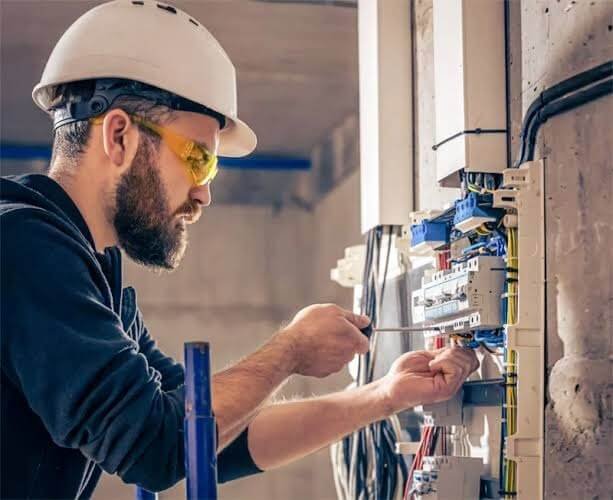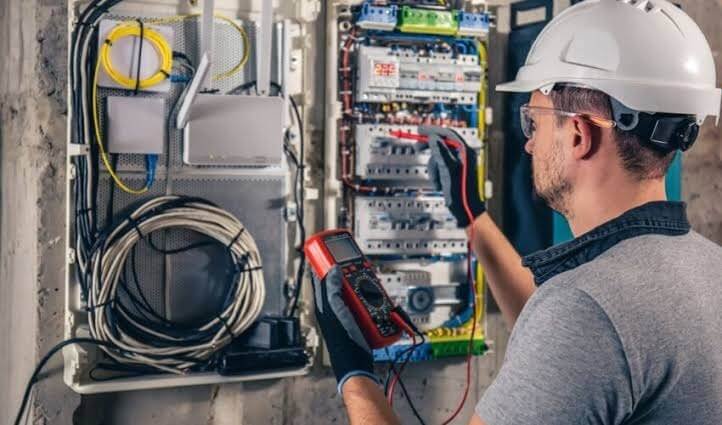Choosing the right electrical contractor is one of the biggest decisions in commercial and industrial project development and yet many organisations don’t understand the huge difference between basic electrical services and full contracting capabilities. In today’s complex electrical world the difference between maintenance work and project delivery has never been more important.
Professional electrical contracting is more than just circuit installation or equipment replacement. It’s full project management, engineering analysis, system integration and ongoing support services that ensure electrical infrastructure performs at its best throughout its operational life.
The complexity of modern electrical systems, combined with safety requirements and performance expectations means contractors need to have specialisation, proven methodologies and capabilities that go way beyond traditional electrical trade skills.
Understanding these differences means informed decision making that protects your investment and delivers project success in commercial and industrial environments.

Defining Professional Electrical Contracting
Scope of Services and Capabilities
Professional electrical contracting involves a full lifecycle project management including the initial conceptual design and continuing maintenance and optimization. The services combine an expertise in engineering with a capacity to construct, and offer turnkey electrical services.
Design-build services integrate engineering design and construction implementation into a single-source of responsibility, which makes the delivery of the project more streamlined, but allows the design intent to meet the reality of the installation. This strategy lowers the risk in the projects as well as faster schedules.
Value engineering services also point out the areas of cost and performance enhancements without reducing safety and functionality. The knowledge of the experienced contractors on alternative materials, methods, and technologies is used to increase the project value.
System commissioning provides a way to ensure that systems installed in electrical systems are functioning as per the designs requirements and specifications. Before a system is accepted, professional commissioning tests control sequences, protection settings, and integration functions.
Technical Expertise Requirements
Power system analysis capabilities distinguish professional contractors from basic electrical service providers. These capabilities include load flow analysis, short circuit studies, and protective device coordination that ensure safe, reliable system operation.
Motor control expertise encompasses understanding of starting methods, speed control technologies, and protection requirements for industrial motor applications. This knowledge ensures optimal equipment selection and system performance.
Power quality engineering addresses harmonic distortion, voltage regulation, and power factor considerations that impact sensitive equipment operation. Professional contractors understand these phenomena and implement appropriate mitigation strategies.
Automation system integration requires understanding of programmable logic controllers, communication networks, and human-machine interfaces that connect electrical systems with operational control platforms.
Evaluating Best Electrical Contractor Candidates
Technical Qualifications and Certifications
Best electrical contractor evaluation begins with verification of appropriate licensing, bonding, and insurance coverage that demonstrates professional standing and financial responsibility. These credentials provide protection while indicating serious professional operations.
Professional engineering capabilities within contractor organizations ensure access to specialized expertise for complex design and analysis requirements. In-house engineering resources provide better coordination and faster response than external consultants.
Manufacturer certifications and training demonstrate contractor familiarity with specific equipment technologies and installation requirements. These certifications often provide access to enhanced warranties and technical support.
Continuing education investments indicate contractor commitment to maintaining current knowledge of evolving technologies, codes, and industry best practices. Professional development demonstrates dedication to service excellence and technical competency.
Project Experience and Track Record
The experience of industrial projects can give insights on the potential of the contractors in handling complex electrical installations in tough conditions. Specialized knowledge and methodology is necessary in manufacturing, processing and heavy industrial projects.
The portfolios of commercial projects reflect the knowledge of a contractor in building systems integration, energy needs, and occupant security. Such projects can typically require the coordination of multiple trades and complicated schedules.
Experience with infrastructure projects suggests that contractors have the ability to handle large-scale installations that have a long life cycle and involve several stakeholders. Such projects demand advanced project management and quality assurance skills.
The verification of references gives objective evidence of how well the contractor performs, their customer satisfaction and ability to solve problems. The interview of other past clients can give a lot of insight into the dependability of contractors and the quality of their services.

Quality Assurance and Safety Programs
Safety performance records provide critical insights into contractor operational practices and professional commitment. Low accident rates and comprehensive safety programs indicate professional operations that protect workers and minimize project risks.
Quality management systems demonstrate contractor commitment to consistent service delivery and continuous improvement. These systems include documented procedures, performance metrics, and customer feedback mechanisms.
Testing and commissioning procedures ensure installed systems meet specifications and performance requirements. Comprehensive testing validates system operation while identifying potential problems before they impact facility operations.
Documentation standards include as-built drawings, test reports, and maintenance procedures that support ongoing system operation and maintenance. Professional documentation facilitates troubleshooting and enables effective system management.
Best Electrical Contractor Near Me: Local Considerations
Regional Expertise and Market Knowledge
Best electrical contractor near me searches should prioritize contractors with established local presence and regional market knowledge. Local contractors understand utility requirements, permitting processes, and code variations that impact project execution.
Utility coordination experience enables effective management of interconnection requirements, service installations, and protective relay coordination. Local contractors maintain relationships with utility personnel that facilitate smoother project approval and execution.
Supply chain management capabilities ensure timely material procurement and delivery while managing costs effectively. Regional contractors understand local supply sources and logistics considerations that impact project schedules and budgets.
Climate and environmental considerations influence material selection, installation methods, and protection requirements. Local contractors understand these factors and implement appropriate strategies that ensure long-term system reliability.
Service and Support Capabilities
Emergency response capabilities provide assurance that critical electrical problems receive prompt attention and resolution. Local contractors can respond quickly to emergency calls while maintaining relationships that support ongoing operational needs.
Maintenance service capabilities enable ongoing system optimization and reliability enhancement through scheduled maintenance programs. Regular maintenance prevents problems while extending equipment life and maintaining optimal performance.
Training and support services ensure facility personnel can operate and maintain electrical systems effectively. Local contractors can provide convenient training schedules and ongoing support that enhances system value.
Parts and warranty support provide assurance that replacement components and warranty services remain accessible throughout equipment operational lifecycles. Local contractors maintain inventory and supplier relationships that ensure prompt problem resolution.

Top Residential Electrical Contractors vs. Commercial Specialists
Residential vs. Commercial Expertise
Top residential electrical contractors excel in home electrical systems but may lack the specialized knowledge required for complex commercial and industrial applications. Business facilities such as three-phase power systems, motor controls, and industrial automation have very different needs that commercial contractors are familiar with and understand.
Commercial facilities require load calculations that are complicated through diversity factors, demand factors and growth factors that are not similar to residential applications. Commercial contractors are familiar with these complexities and set up systems in a way that is aware of such complexities.
Commercial installations have code requirements that add in considerations of safety, accessibility, and performance exceeding residential requirements. Commercial contractors are up-to-date with these improved requirements.
Commercial equipment specifications concern more demanding performance, longer maintenance life, and other features unavailable in residential equipment. These differences are known by commercial contractors and they specify proper equipment.
Project Management Differences
Commercial project coordination involves multiple trades, complex scheduling, and stringent timeline requirements that demand sophisticated project management capabilities. These projects require coordination with architects, engineers, and building contractors.
Quality control procedures for commercial projects include formal testing requirements, documentation standards, and performance verification that exceed residential practices. These procedures ensure installations meet professional standards and performance requirements.
Budget management for commercial projects involves complex cost control procedures, change order management, and financial reporting that requires specialized expertise and systems. Professional contractors maintain detailed cost tracking and reporting capabilities.
Stakeholder communication includes regular progress reports, technical briefings, and coordination meetings that keep all parties informed of project status and requirements. Effective communication prevents misunderstandings and ensures project success.
Advanced Services and Specializations
Power Quality and Energy Management
Power quality analysis and correction services address voltage disturbances, harmonic distortion, and power factor problems that impact sensitive equipment operation. These services require specialized test equipment and analysis capabilities.
Energy efficiency optimization involves comprehensive system analysis and improvement recommendations that reduce operational costs while enhancing performance. These services require understanding of utility rate structures and efficiency technologies.
Demand response integration enables participation in utility programs that provide financial incentives for load reduction during peak demand periods. Implementation requires sophisticated control systems and monitoring capabilities.
Renewable energy integration includes solar photovoltaic systems, energy storage, and grid interconnection technologies that enable facilities to generate their own power while maintaining grid connectivity.
Automation and Control Systems
Industrial automation services encompass programmable logic controller programming, human-machine interface development, and communication network implementation that connects electrical systems with operational control platforms.
Building automation integration connects electrical systems with HVAC, lighting, and security systems to create intelligent building environments that optimize performance and reduce operational costs.
Motor control system design and implementation includes sophisticated starting methods, speed control technologies, and protection schemes that ensure reliable operation of critical industrial processes.
Process control integration connects electrical systems with production control networks, enabling coordinated operation of manufacturing equipment and facility infrastructure systems.
Financial Considerations and Value Assessment
Cost Structure Analysis
The costs that are involved in professional electrical contracting are inclusive of the engineering costs, material costs, installation costs, testing costs, and commissioning services. The knowledge of these cost pieces allows proper budgeting and value of a project.
Lifecycle costing does not just take into consideration the cost of installing something but the maintenance cost, the energy used and the replacement of the items. These factors are recognized by professional contractors and systems are designed which minimize total cost of ownership.
Value engineering services recognise value opportunities in terms of potential cost reduction without trade-offs in performance or reliability. Expert contractors will use their know-how of alternative solutions and technologies to maximize project value.
Financing alternatives such as equipment leasing, energy service contract can minimize immediate capital investments and provide a professional installation and continuing optimization services.
Return on Investment Metrics
Energy savings quantification is the means of objectively measuring contractor value in the form of utility cost savings and system efficiency. Professional contractors know how to quantify and report such benefits.
Efficient operations are achieved through effective electrical systems that reduce downtime due to the reliability of the system. These benefits can be more substantial than direct energy savings in total economic impact.
Among the benefits offered by the reduction of risks are enhanced safety, lower insurance premiums, and safeguard against electrical issues that can be expensive to fix. The systems and processes introduced by professional contractors reduce the risk of operation.
Professional installations lead to asset value increases because the capabilities of the facilities, as well as marketability, are enhanced. Good electrical infrastructure is an important part of the value of the property and work capacity.
Conclusion
Choosing a professional electrical contractor requires more than just technical skills, experience and services that go beyond basic electrical installation. Modern electrical systems demand contractors with broad expertise and proven methods.
Professional electrical contracting brings value through engineering, quality installation and support services that ensure optimal system performance throughout the lifecycle. This is what sets professional contractors apart from basic electrical service providers.
Investing in qualified electrical contracting services yields measurable results in reliability, performance and cost savings. Professional contractors ensure projects meet tough requirements and provide long term value and protection.
IET’s 75 years of electrical engineering heritage in East Africa makes us the region’s leading electrical contractor for complex commercial and industrial projects in Kenya, Uganda and Tanzania. Our comprehensive capabilities in power distribution, automation systems, power quality solutions and building management technologies and over 150 successful projects under our belt position us to handle your most challenging electrical infrastructure needs. Contact IET today to partner with East Africa’s most experienced electrical contractor and get exceptional results through professional excellence and technical expertise.

Leave a Reply